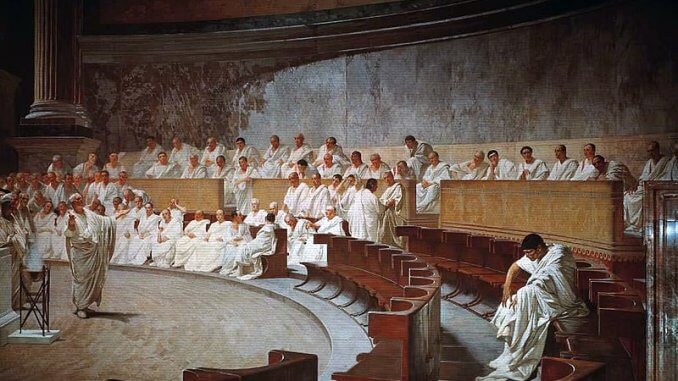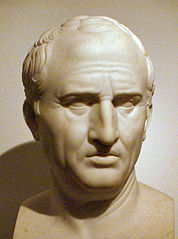
Rather than staying rigidly faithful to a single philosophical tradition, some Romans preferred to draw upon and combine ideas from the various schools of philosophical thought to address particular practical problems and situations. In doing so, they helped create a new system of philosophy known as “eclecticism”, a term which comes from the Greek word “eklektos”, meaning “to pick out or select”.

The most famous Roman eclectic was Marcus Tullius Cicero (106 – 43 BC), a lawyer and statesman who rose to the position of consul (the highest elected political office of the Roman Republic) in 63 BC. In the same year that he became Consul, Cicero successfully exposed and defeated a terrorist plot against the city led by his political adversary Catiline (also known as “the Catiline Conspiracy”). The featured image at the start of this post shows Cicero mid-speech in front of the Senate, making his case against the treasonous Catiline who is shown on the far right of the picture.
As well as being one of the great orators of the time, Cicero was also an important philosophical thinker. Educated in Rome, Athens and Rhodes, he was well-versed in the ideas of Socrates, Plato and Aristotle, as well as the doctrines of Scepticism, Stoicism and Epicureanism. He drew upon ideas from each of these schools when outlining his own brand of political philosophy and ethics. His strongest influence, however, was stoic thought, particularly later in his life, after he had witnessed the downfall of the Roman Republic – a system which he had staunchly defended throughout his political career.
Much of what we know today about the politics and society of the late Roman Republic is drawn from Cicero’s writings. His most famous philosophical work, On Duties, used various concepts and theories from Greek philosophy to articulate the political and ethical values – as he saw them – of the Roman Republic. And his political works, On the Republic and On the Laws, provide us with a detailed examination of the Roman “mixed constitution” – a combination of monarchy, aristocracy and democracy – which Cicero believed was the key to Rome’s success.
In 48 BC Cicero ended up submitting to the military general Julius Caesar who installed himself as dictator, an act which effectively brought the Republic to an end. After Caesar’s assassination in 44 BC, rumours circulated that Cicero had been involved in the plot to have him murdered, and in 43 BC he was executed by Roman soldiers after attempting to flee from Italy.
Other notable Roman eclectics include Marcus Terentius Varro (116 – 27 BC) and Lucius Annaeus Seneca (circa 4 BC – AD 65), although the latter was more strongly influenced by stoic thought.


